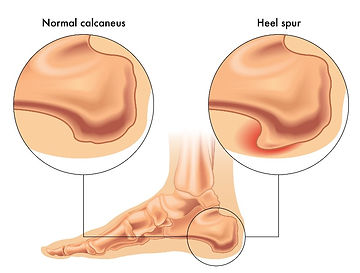Heel Pain
Heel pain is most often caused by plantar fasciitis, a condition that is sometimes also called heel spur syndrome when a spur is present. Heel pain may also be due to other causes, such as a stress fracture, tendonitis, arthritis, nerve irritation or, rarely, a cyst.


Heel pain is not usually caused by a single injury, such as a twist or fall, but from repetitive stress and pounding of the heel.
There are several common causes of heel pain.
-
Plantar fasciitis. Plantar fasciitis occurs when too much pressure on your feet damages the plantar fascia ligament, causing pain and stiffness. Find out what causes this condition and possible treatment options.
-
Sprains and strains. Sprains and strains are injuries to the body, often resulting from physical activity. These injuries are common and can range from minor to severe, depending on the incident. Learn more about sprains and strains.
-
Fracture. A fracture is a broken bone. This condition is considered a medical emergency. Urgent care may be required. Know what symptoms to look for and who’s at risk.
-
Achilles tendonitis. Achilles tendonitis occurs when the tendon that attaches the calf muscles to the heel becomes painful or inflamed due to overuse injuries. Find out how this condition is diagnosed and treated.
-
Bursitis. Bursae are fluid-filled sacs found about your joints. They surround the areas where tendons, skin, and muscle tissues meet bones.
-
Ankylosing spondylitis. This form of arthritis primarily affects your spine. It causes severe inflammation of the vertebrae that might eventually lead to chronic pain and disability. Read more about ankylosing spondylitis.
-
Osteochondroses. These disorders directly affect the growth of bones in children and adolescents. Learn more about the different types of osteochondroses.
-
Reactive arthritis. An infection in the body triggers this is a type of arthritis. Find out more about its causes, symptoms, and possible treatments.


Treatment
-
Calf stretches can help if performed in the right manner. Podiatry Care has a unique stretching and strengthening program specifically designed for the treatment of plantar fasciitis and heel pain.
-
Ice massage can assist in the short term
-
Panadol/Asprin/N.S.A.I.D’s can help short term but rarely help in the longer term.
-
Training/activity evaluation is important
-
No barefoot walking – always use shoes or supportive footwear
-
Shoe evaluation is important
-
Exercises before getting out of bed and arising from rest should be discussed.
-
Anti-inflammatory gel massage can assist short term but rarely helps long term.
